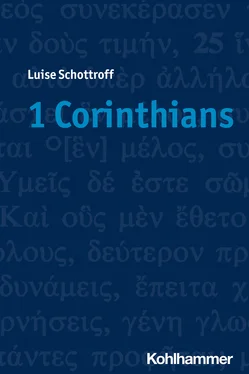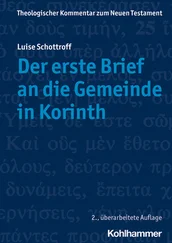1 ...8 9 10 12 13 14 ...25 1:18What is meant by the logos about the cross, which is usually translated by the »word or message about the cross«? Who speaks the word to whom here, and what is its content?
What is meant by the crossis the crucifixion of Jesus in Jerusalem. In the years in which Pilate was the prefect of Judea (26–36 CE), Jesus was publicly executed by the Roman army. Paul also refers to the crucifixion in 2:6–8. The Roman Empire used crucifixion for politically disciplining the population, especially people from subjugated nations whom they had enslaved. 67There were Roman crucifixions, including mass crucifixions, before Jesus’ death and for a long time thereafter. When this letter to Corinth was written, crucifixion was a real threat to the population, especially for society’s lower classes. Anxiety about attracting attention and the pressure to conform were great and kept the population in line. A word of solidarity about someone crucified or tears of sorry in public could lead to imprisonment and one’s own execution. 68To worship as raised from the dead by God someone who had been crucified was risky and politically audacious, that could at any moment put your life in danger, independent of membership in a religious community. As long as the Roman Empire carried out executions, the cross could never have been a religious symbol, except as a symbol of power (see the basic information at 11:23).
Since the time of Augustus, Rome pursued a comprehensive and politically motivated politics ofr eligion.There was a well-thought-through state religion or, better, loyalty religion that served the objectives of the pax Romana. 69It was impossible to miss in the temples in major cities, even in Corinth (see 8:10). The peoples subjugated by Rome could continue to practice their traditional religions if they did not come into conflict with state loyalty religion. Jews got into such conflicts again and again. 70Alongside of this fragile toleration there were socially deviant alignments over against a constant politics of suppression by the emperor and the senate. In this line is an edict from 19 CE that effected, and others, Rome’s Jewish population:
He [Tiberius] abolished foreign cults, especially the Egyptian and the Jewish rites, compelling all those who were addicted to such superstitions to burn their religious vestments and all their paraphernalia. Those of the Jews who were of military age he assigned to provinces of less healthy climate, ostensibly to serve in the army; the others of that same race or of similar beliefs he banished from the city. 71
To be sure, the »Jewish sects« in 19 CE are not to be correlated with groups acclaiming Jesus as Messiah, but the religio-political and legal presuppositions with which the congregation in Corinth had to reckon show themselves here.
Denial of the Crucifixion
In 1:18 Paul must do battle with people within the congregation in Corinth who consider it to be mōria /foolishness, idiocy, imprudence to be in solidarity with Jesus’ crucifixion and, thereby, also with crucifixions. The pressure was so great that again and again people denied that they belonged to Jesus ( aparneō or arneō , for example Matt 26:34, 70). Another Greek word for this is skandalidzō /to take offense. In the figure of Peter, the Synoptic Gospels have established an empathic monument to this shocking danger of solidarity with Jesus and with one another. Peter had betrayed Jesus, though he had not wanted to do so. His fear was too great (Mark 14:66–72 and parallels). This account was written and handed on long after Jesus’ death, not because Peter should be remembered as a weak character, but because it evokes courage that he succumbed to his fear and then, in spite of that, stood up again and was found to be at the side of the Risen One. The danger posed by political pressure plays a significant role in the gospels; see the flight of all the disciples after Jesus’ arrest (Mark 14:50) or also Mark 4:17; Mark 8:34–38 and parallels. These traditions are not recounted with the conviction, »This can’t happen to us.« Those involved knew that the fear of brutal executions and persecution was not some remote possibility. When Paul did battle with people in the Corinthian congregation who found it foolish or imprudent to hold up the Risen One for all to see as the one who had been crucified, he didn’t have in mind »opponents« or heretics who believed something different from what he believed, but instead people who asked whether fellowship with the Messiah was possible without political peril.
From testimonies about persecutions of Christian congregations we learn that believers during their trials or even earlier renounced the faith and then even betrayed their brothers and sisters. 72In addition to these testimonies from 64 and about 110 CE, there are discussions from within the congregations arising in the second century. Here one also finds the argument that taking upon oneself the peril of being associated with the Crucified One is »madness.« Thus, Tertullian reports that there were »opponents of martyrdom« who argue that it is »pointless« to sacrifice one’s own life by publicly testifying adherence to the crucified Messiah Jesus. »But the unsophisticated souls know not what is written, and what meaning it bears, where and when and before whom we must confess, or ought , save that this, to die for God, is, since He preserves me, not even artlessness, but folly, nay madness.« 73The »foolishness« of speaking about the crucifixion in Corinth becomes understandable from this text, even if it comes from the period around 200 CE, »in every case, the attitude toward martyrdom corresponds to the interpretation of Christ’s suffering and death.« 74
If it has become so obvious why people betrayed Christ, it needs to be asked why others did not do that, why they resisted the pressure. What did they gain by belonging to the Messiah? The messianic community had together summoned the strength to forge a way of life that stood in opposition to the one society offered. In this way the »wisdom of the world« and the might of the of this world’s powers were overcome. The Christian Justin Martyr wrote with reference to his community (before 165 CE):
and we who were filled with war, and mutual slaughter, and every wickedness, have each through the whole earth changed our warlike weapons,—our swords into plowshares …—and we cultivate piety, righteousness, philanthropy … For it is plain that, though beheaded and crucified, … we do not give up our confession. 75
A legend about the venerable Polycarp (executed on February 22, 156 CE) reports that after his arrest he was brought to an arena in which wild beasts had already been assembled to tear people limb from limb. In this situation he was urged to save his skin: »Swear by the fortune of Caesar; repent, and say, Away with the Atheists.« 76The »Atheists« is a reference to the enemies of Rome who because of their rejection of the official Roman religion were branded as godless atheists. »But Polycarp, gazing with a stern countenance on all the multitude of the wicked heathen then in the stadium, and waving his hand towards them, while with groans he looked up to heaven, said, ›Away with the Atheists.‹ Then, the proconsul [urged] him … saying, ›Swear, and I will set thee at liberty, reproach Christ.‹«
As we can see, the proconsul was not taken in by Polycarp’s cunning. Polycarp could in all honesty label as atheists the people in the arena waiting for the murders. Nevertheless, the proconsul demanded that Polycarp curse Christ, distance himself from Rome’s enemies (the atheists) and acknowledge Rome’s official religion. Polycarp died; his concern was his own liberation from the powers and the liberation of his brothers and sisters. 77
Читать дальше












